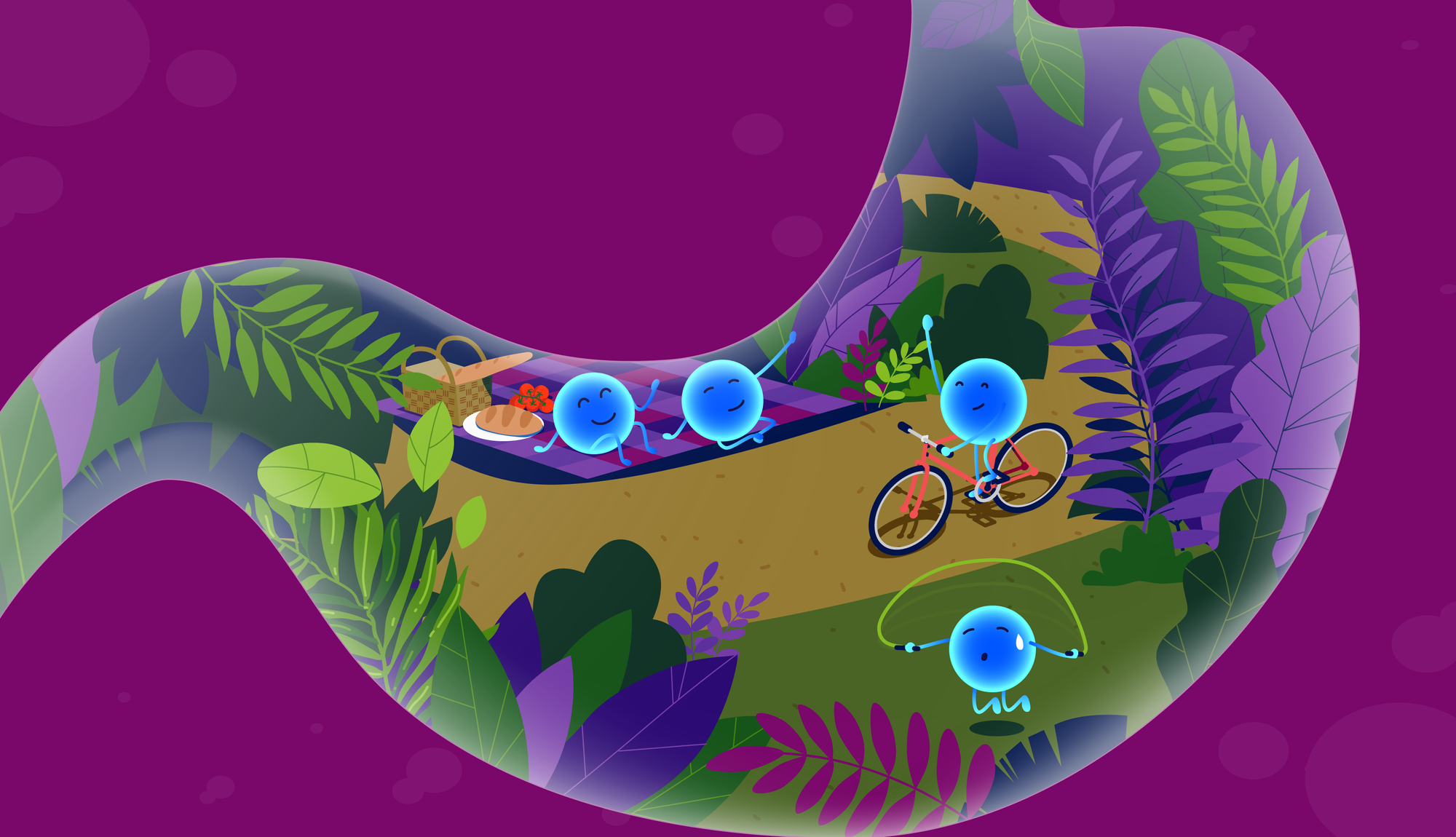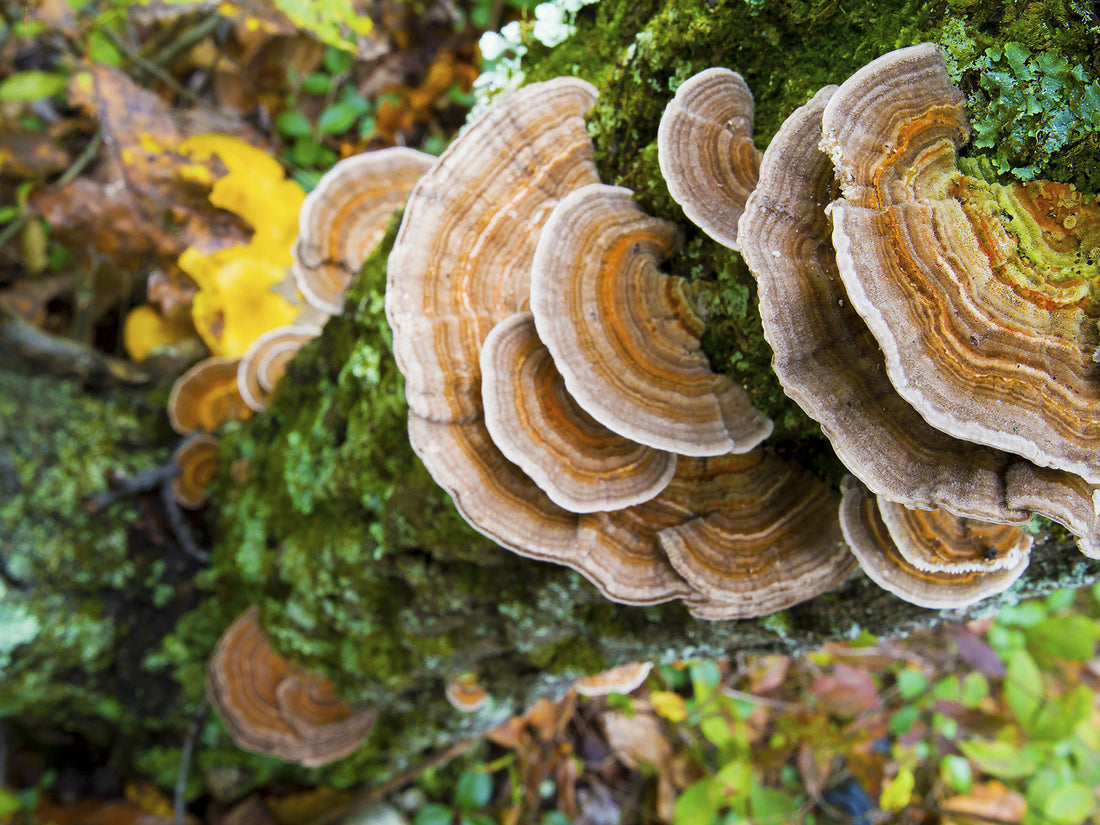Introduction
Trametes Versicolor, commonly known as Cloud Mushroom or Turkey Tail, is a mushroom renowned for its vibrant colors. Its hues range from brown, yellow, grey, purple, green, to black, with a pale outer margin that is typically cream or white. The mushroom often forms layered caps, resembling tiers, and is frequently found on fallen logs or tree stumps in North American woods throughout the year.
Usage
Traditionally, Turkey Tail mushroom has been used in Chinese medicine due to its abundance of antioxidants and beneficial compounds. It contains polysaccharide peptide (PSP) and polysaccharide krestin (PSK), which are utilized in medicinal practices. Presently, Turkey Tail mushroom is consumed as a supplement to enhance immune function, support individuals undergoing chemotherapy, and promote the growth of beneficial gut bacteria.

Benefits:
- Immune system: One of the key benefits of Turkey Tail mushroom is its ability to bolster the immune system. A 2012 clinical trial demonstrated that breast cancer patients who took powdered turkey tail mushroom capsules experienced a quicker recovery of immune function after radiation therapy compared to those who did not take the capsules. Additionally, research suggests that the mushroom's compounds possess anti-tumor properties and can enhance the efficacy of chemotherapy in breast cancer patients.
- Gut health: Another advantage of Turkey Tail mushroom is its positive impact on gut health. The mushroom contains prebiotics, which serve as nourishment for the gut microbiome. By supporting the growth and flourishing of probiotics (beneficial gut bacteria), Turkey Tail mushrooms aid digestion, improve gut health, and indirectly enhance the immune system, as the gut and immune system are closely linked. An investigation into the prebiotic effects of a polysaccharopeptide (PSP) produced from Turkey Tail mushrooms and its influence on the gut flora was conducted in 2014. 24 healthy people received an extract of PSP from Turkey Tail over the course of eight weeks. The results showed steady and significant changes in the microbiome's health, including a rise in good bacteria, which is consistent with Turkey Tail's prebiotic qualities. Additionally, comparable findings from a different test-tube study published in 2013 showed that a Turkey Tail mushroom extract could change the makeup of gut flora. In particular, it was shown that the extract increased the population of helpful gut bacterial strains like Bifidobacterium and Lactobacillus while concurrently lowering the numbers of potentially dangerous bacteria like Clostridium and Staphylococcus.

Side Effects
While Turkey Tail mushroom is generally safe for consumption and well-tolerated, some individuals may experience mild side effects such as bloating, dark stools, darkening of the fingernails, gas, or heartburn.
It is advisable to avoid turkey tail supplements if:
- You’re pregnant or breastfeeding, as no research has been conducted on their safety for these individuals.
- Individuals with diabetes should exercise caution, as turkey tail may lower blood sugar levels, potentially causing an excessive drop when taken with diabetes medication
- People with mushroom or mold allergies should avoid turkey tail due to its fungal nature.
It is important to note that the safety of turkey tail mushroom has not been studied in children, and therefore, it is recommended that minors avoid its consumption.
Bibliography
Turkeytail. (n.d.). Retrieved from The Wildlife Trusts: https://www.wildlifetrusts.org/wildlife-explorer/fungi/turkeytailtHE
Curtis, L. (2022, December 23). What is Turkey Tail? Retrieved from Very Well Health: https://www.verywellhealth.com/turkey-tail-mushroom-6890534
Kubala, J. (2023, April 6). Healthline. Retrieved from 5 Immune-Boosting benefits of Turkey Tail Mushroom: https://www.healthline.com/nutrition/turkey-tail-mushroom
Hardin, A. (2010). Turkey Tail Fungus. Retrieved from Macalester: https://www.macalester.edu/ordway/biodiversity/inventory/turkeytailfungus/
Kumar Pallav, Scot E Dowd, Javier Villafuerte, Xiaotong Yang, Toufic Kabbani, Joshua Hansen, Melinda Dennis, Daniel A Leffler, David S Newburg & Ciarán P Kelly (2014) Effects of polysaccharopeptide from Trametes Versicolorand amoxicillin on the gut microbiome of healthy volunteers, Gut Microbes, 5:4, 458-467, DOI: 10.4161/gmic.29558
Yu, Zhuoteng & Liu, Bo & Mukherjee, Purna & Newburg, David. (2013). Trametes versicolor Extract Modifies Human Fecal Microbiota Composition In vitro. Plant foods for human nutrition (Dordrecht, Netherlands). 68. 10.1007/s11130-013-0342-4.

